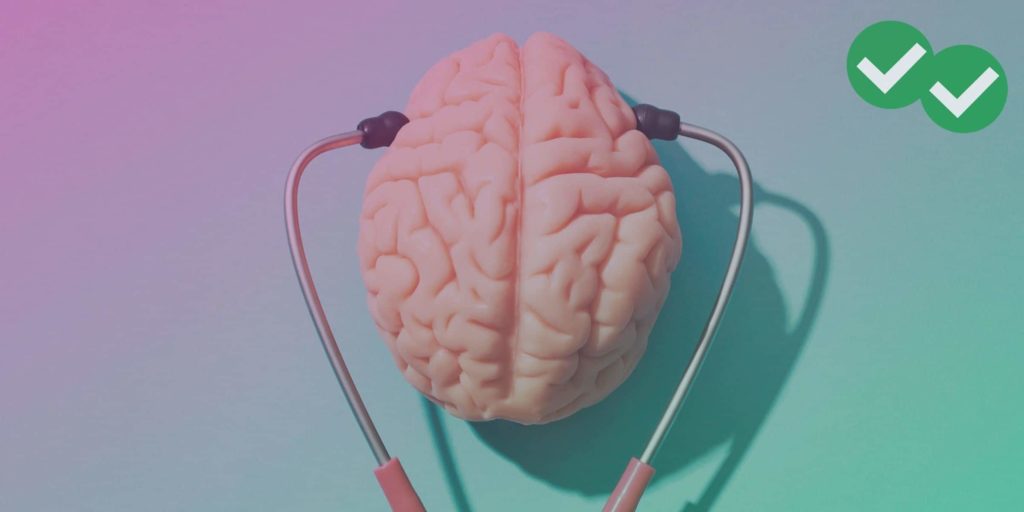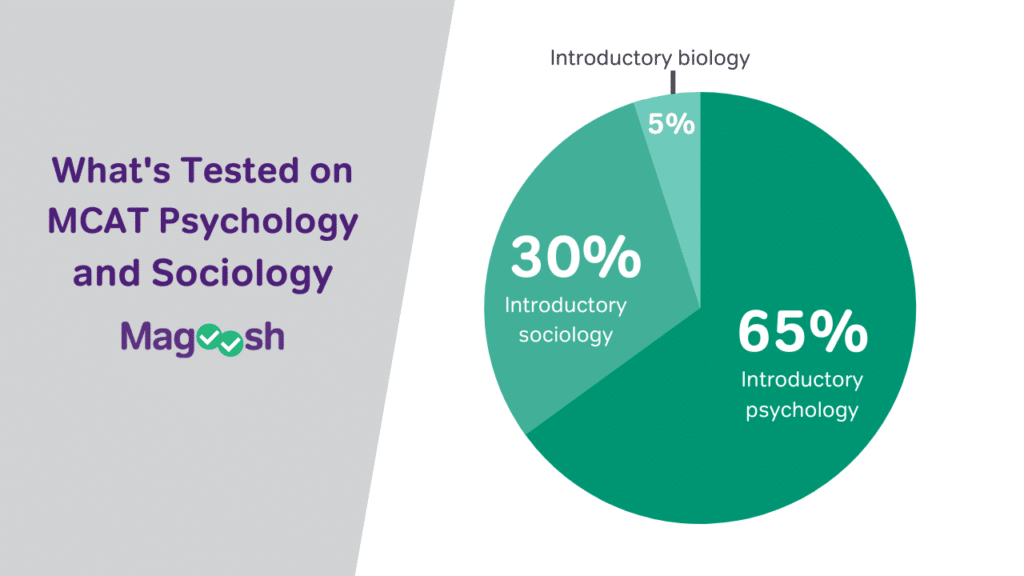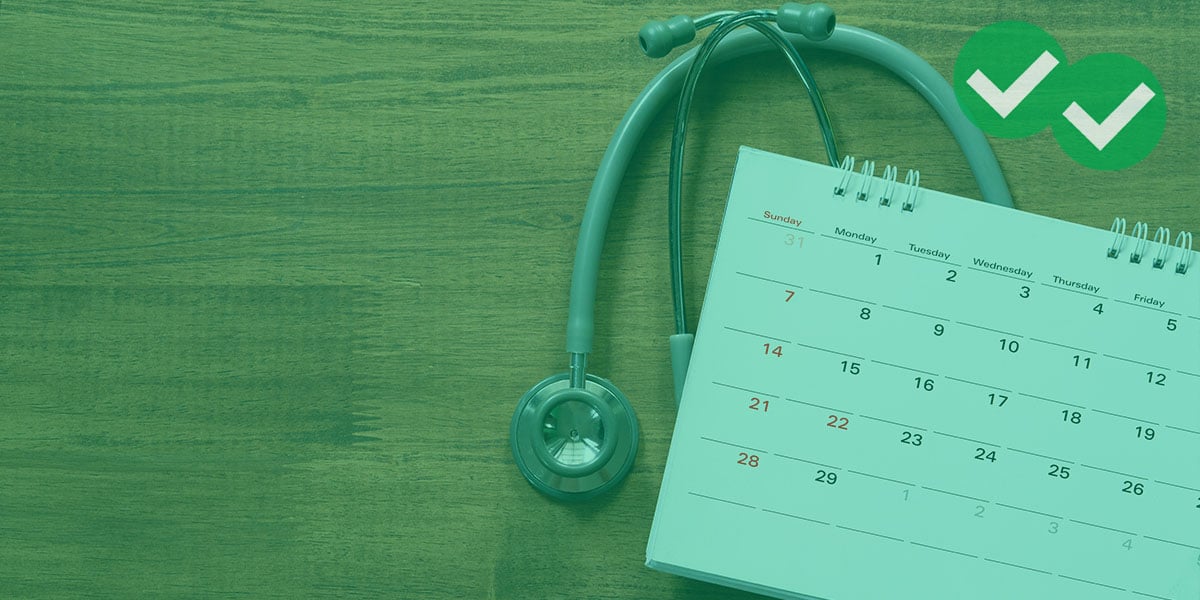
The last science section on the MCAT–counting for 25% of your total score–is called Psychological, Social, and Biological Foundations of Behavior. In it, the test makers have incorporated questions from psychology, sociology, biology, and a bit of social epidemiology. Sociology represents anywhere from 25%-40% of this section. The proportion is debatable because so many topics (stigma, self-concept, child development) overlap with psychology and others (demographic transition, social determinants of health) are shared with epidemiology. But in this post, we’ll dive into the exact topics you’ll need to study for MCAT psychology and MCAT sociology.
So what can you expect to see in the Psych/Soc section on the MCAT? Here’s a quick overview:
| Name | Breakdown |
|---|---|
| Number of Questions | 59 |
| Timing | 95 minutes |
| Time per Question | 1.6 minutes (1 minute 36 seconds) |
For a full overview of specific topics you’ll see on all MCAT sections, check out our expert-curated list of MCAT topics!
Ready for a deeper dive? Here’s what you need to know about MCAT psychology and MCAT sociology.
Table of Contents
- What’s Tested On MCAT Sociology and Psychology
- How do I study for MCAT Psychology?
- How do I study for MCAT Sociology?
- MCAT Psychology and Sociology Practice Questions
- Takeways: MCAT Psychology and Sociology
What’s Tested On MCAT Sociology and Psychology
Although it would seem logical for the section to break down 50/50 into sociology and psychology, that’s not what actually happens. Remember, the full title is “Psychological, Social, and Biological Foundations of Behavior.” With that in mind, here’s the topic breakdown you can expect to see on the official MCAT.

- Introductory psychology: 65%
- Introductory sociology: 30%
- Introductory biology: 5%
So, how should you tackle MCAT Psychology and Sociology on the MCAT?
First, take a look at these Magoosh premium lesson videos:
- How to study sociology for the MCAT (FREE!)
- How to study psychology for the MCAT (Premium only)
- 53 high-yield MCAT lessons (Free with trial!)
Now, here are even more in-depth study strategies you can use to study for sociology and psychology MCAT questions!
![]()
![]()
How do I study for MCAT Psychology?
First of all, what psychology courses should you take for the MCAT Psychology questions? Either an intro course—or none at all, if you’re able to put in the work. Some medical schools have begun requiring applicants to take one semester of introductory psychology, and a few schools require sociology as well as psychology. In the next few years, more schools will probably follow suit, and medical school psychology prereqs may become the norm (though medical school sociology prereqs are less likely to). However, if you do not plan on taking these introductory courses and will not be applying to any schools with this requirement, you can certainly self-study this material.
- First of all, the AAMC has created a very helpful PDF roadmap to the MCAT content in psychology and sociology textbooks. This document includes a list of textbooks that students can obtain for their MCAT psychology and sociology studies. As textbooks vary, the roadmap lists exactly which chapters and pages that students need to read in each book. Some of the books on the list are free and accessible online so you can start your studying today! Magoosh also offers MCAT prep to help you prepare for psychology and sociology.
- Alternatively, you can start a journal club with your friends. Every week, you will all read a scientific article from a peer-reviewed journal and then meet to discuss your thoughts.
- Finally, no matter how much you review concepts or read science articles, you will still need to do practice questions. To excel on the MCAT’s Psychological, Social, and Biological Foundations of Behavior section, you must learn how to apply your knowledge and analytical skills to practice passages and questions about all of the psychology categories the exam tests. This, of course, is true for all four sections of the MCAT, so make sure you make time in your study schedule to do lots of practice!
On top of doing stand-along questions, you will also need to read and answer questions associated with passages to prep for MCAT Psychology. The majority of these passages will be on science experiments. You will need to be able to understand experimental design, read graphs and figures of experimental data, and interpret experimental results. Getting involved in a research lab is a great way to strengthen your ability to answer questions on these experiment-based passages.
![]()
![]()
How do I study for MCAT Sociology?
Do you need to take sociology for the MCAT? It wouldn’t hurt, but it’s not necessary. Most sociology MCAT concepts on the new MCAT are easy to memorize and don’t require much explanation. You could probably learn 60% of the content by reading a test prep book and reviewing flashcards. Eventually, the MCAT might test students on subtle and obscure areas of sociology, but so far, it doesn’t.
Another encouraging factor is sociologists study contemporary social issues that you already know a bit (or great deal) about, such as mass media and technology, cultural conflicts, urbanization, and globalization. Many students are able to make educated guesses about social phenomena based on their observations of day-to-day life, especially if they follow the news and current events.
So what should you do? Here are our top sociology study tips for the MCAT!
- Only read what is necessary. You have limited time to study, and you don’t need to read paragraphs or pages if bullet points will do. However, you should read certain topics in detail: research methods, macro/micro distinctions, and the main theories and theorists. Much of this is found in the first few chapters of introduction to sociology books.
- Skim public health journals. To understand sociology in relation to health, I recommend skimming primary research studies on health disparities. Even if you only spend 2 hours (total!) looking through these journals, you’ll have gained familiarity with social perspectives on health. You’ll also start recognizing patterns in the health topics. It’s probable that the MCAT will give you passages on health conditions related to aging, poverty, gender differences, or environmental exposures.
- Memorize 40 Sociology terms each day. If you learn 40 MCAT sociology terms each day, you’ll make speedy progress. If you’re using flashcards, it’s fine to use a pack that groups psychology and sociology together; just make sure that they aren’t skimping you on the sociology terms. At least a third of the pack should cover sociology.
- Study concepts that others ignore. Remember, your MCAT score is determined by how many correct answers you get in relation to other test takers. The areas below are sparsely covered in most MCAT test prep books. Pay attention in order to get the edge!
- Strive to know all the terms listed under “health and medicine” in this AAMC article. Some general sociology texts reference these terms, but many do not.
- Pay attention to everything related to demographic changes and fertility and mortality listed here, which are not major concepts in general sociology.
- Take a look at health and healthcare disparities mentioned here. They don’t provide much information on the specifics, do they? Unfortunately, neither do most of the MCAT test prep books. Fill in the gaps by researching the terms online or using the Magoosh MCAT course.
- Practice Psy/Soc/Bio Foundations passages. As with all sections on the MCAT, you’ll want to practice answering questions from passages.
MCAT Psychology and Sociology Practice Questions
Brush up on your MCAT psychology and sociology knowledge—and find gaps in your studying—with this quick quiz!
- On the actual MCAT, you’ll see more than one question about the passage. Once you’ve tried out the one above, come back and try your hand at Question 2 and Question 3!
Takeaways: MCAT Psychology and Sociology
What do you need to master MCAT Psychology and Sociology? In short, you will want to review and memorize the necessary content, familiarize yourself with scientific research, and do practice questions (Magoosh now has over 700!) Although this section requires a slightly different approach than the Biology/Chemistry/Physics sections do—but it’s worth 25% of your overall score, so it’s worth taking the time to get it right. Good luck!






